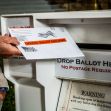With November 3 approaching, most of the country is focused on the big names of the 2020 general election, and the words “split roll” aren’t set to dominate the headlines anytime soon. But in California, those words are all the more significant in light of the onslaught of pandemic updates, forest fire news, and economic twists. In fact, they might give the state a long-term opportunity to support a major tax agenda that presidential candidates have tossed around in other—often unimplemented—ways for years.
Californians will vote on a new state constitutional amendment, Proposition 15. The ballot initiative would shift tax dollars to educational institutions by taking aim at the dominating corporations that have made Silicon Valley and Hollywood legends of innovation and profit in the state. The amendment would implement “split roll” to raise taxes on industrial and commercial properties worth over $3 million by basing taxation on market value, rather than purchase price.
Alex Stack, a spokesperson for the Yes on 15 group advocating for the amendment, conveys confidence in its intent and expected effect.
“This initiative is about closing corporate property tax loopholes on the biggest, most profitable corporations in the state,” Stack said in a statement. According to him, it targets the “top 10%” of these corporate California giants.
The affected properties are those that have trudged through decades of expansions since their creation, such as Hollywood studios, Intel, and IBM, without a significant increase to their property taxes. Walt Disney Studios has long enjoyed rates of less than six dollars per square foot in Burbank, while comparable properties with newer ownership pay a couple of hundred dollars per square foot. Chevron, which was assessed in 1975 alongside the Disney property, has saved itself around $100 million a year.
The amendment would change California’s Proposition 13, passed in 1978, which offered consummate tax protection to these mammoth properties. If Proposition 15 does not pass by popular vote, the old tax shields stay in place: properties will continue to be taxed no more than one percent of their purchase price, an amount adjusted annually in accordance with the inflation rate or two percent, depending on which is lower each year.
Residential properties are unaffected, as are businesses with less than $3 million in holdings in the state of California, so homeowners and small businesses can vote on this referendum without fearing tax increases for themselves. Also exempt would be a small business’ “tangible personal property” (tangible personal property of non-small businesses can expect exemptions for a value of $500,000).
The ballot initiative defines “small business” more specifically to ensure proper regulation and implementation of the prospective tax law. To qualify as “small” under Proposition 15, a business must have no more than 50 employees, own property in the state, and be independently owned and operated. The agricultural industry would also maintain some safe distance from the initiative.
As of late September, UC Berkeley’s Institute of Governmental Studies estimated a 15-point lead of support for Proposition 15, boasting a prolonged surge of positivity behind the amendment. Stack calls this “another very encouraging sign,” with well over 50 percent of voters polling in favor of the initiative over the past year.
Stack says the amendment will “reclaim nearly $12 billion every year for schools and critical local services” by removing the legal loopholes for big corporations, “all while protecting homeowners and renters, small businesses, and agriculture,” said Stack, adding that small businesses will enjoy cuts to personal property taxes.
For most affected businesses, the legislation would go into effect during the 2022-23 fiscal year; small businesses will see changes by the 2025-26 fiscal year or later depending on future decisions, a power that the amendment awards to state legislators.
If passed, the tax increases will generate an estimated $8 billion to $12.5 billion a year once fully implemented. Out of everyone affected by the modifications, over 90 percent of that money will come solely from the top 10 percent.
Though that top 10 percent may suffer, per se, advocates assert that their increased contributions will be an incomparable boost to the state’s communities. The billions of dollars generated are expected to funnel into funding for public schools, community colleges, and local governments—all the more tantalizing a vision to behold as the state suffers from both the pandemic’s debilitating economic effects and the ongoing devastation wreaked by some of the worst forest fires in California’s history.
However, the opposition has poured millions into diminishing the amendment’s chance of success—often with misleading messages that communicate fear to homeowners.
One ad campaign, run by Blackstone, an East Coast-based corporation, cost around $7 million—
only to be fact-checked and taken out of circulation for claiming false information about the amendment’s consequences. It claimed Proposition 15 would repeal Proposition 13 entirely and hike up electricity costs for homeowners by gouging solar properties with unfairly swollen tax spikes.
In reality, analysts and economists estimate the impacts will simply “reduce windfall profits” rather than incite price increases for consumers.
"If you think that corporations pass down the savings they get from tax loopholes to small businesses and consumers, I have a bridge to sell you,” Stack said in a statement. “The corporate funders behind these ads, such as NYC-based Blackstone and Trump megadonor Geoffrey Palmer, make money off of California's tax breaks – they'll say whatever it takes to keep it that way.”
Indeed, the effects of Proposition 15 on solar should be of minimal concern to individual Californians. For example, voters passed Proposition 7 in 1980 to protect the state’s growing prolific solar industry from such tax detriments. That initiative has secured consistent legal extensions over the years, culminating in a key piece of legislation passed this summer, i.e., Senate Bill 364, which solidifies the commercial solar industry’s immunity to potential tax concerns with
Proposition 15 through at least the next four years, pacifying both industry and consumer concerns.
According to the Yes on 15 campaign, Proposition 15 is the result of 1.7 million people who “believe that wealthy corporations need to pay their fair share.” Their website even includes an interactive county-by-county guide for residents to see just how much their own bubbles stand to benefit. State officials cite dire funding situations across California and regard the amendment as a titanic opportunity for communities.
“This is a choice between perpetuating a tax break for the wealthiest corporations in our state or expanding the critical local services to reduce homelessness, reduce emergency wait times and improve our neighborhoods—at zero cost to residents,” said Los Angeles Mayor Eric Garcetti. “These numbers show just how critical of a choice that is.”
Despite well-funded opposition, Proposition 15 shines as an overdue reckoning for big business. With tax rates set back in the 1970s, it appears most of California believes the contributions of these corporations should have evolved a bit since their conception. After all, computer and tech industries born in the state have certainly enjoyed the unparalleled plunders of their advancements over the past 50 years, so shouldn’t their tax contributions step into the 21st century as well?






